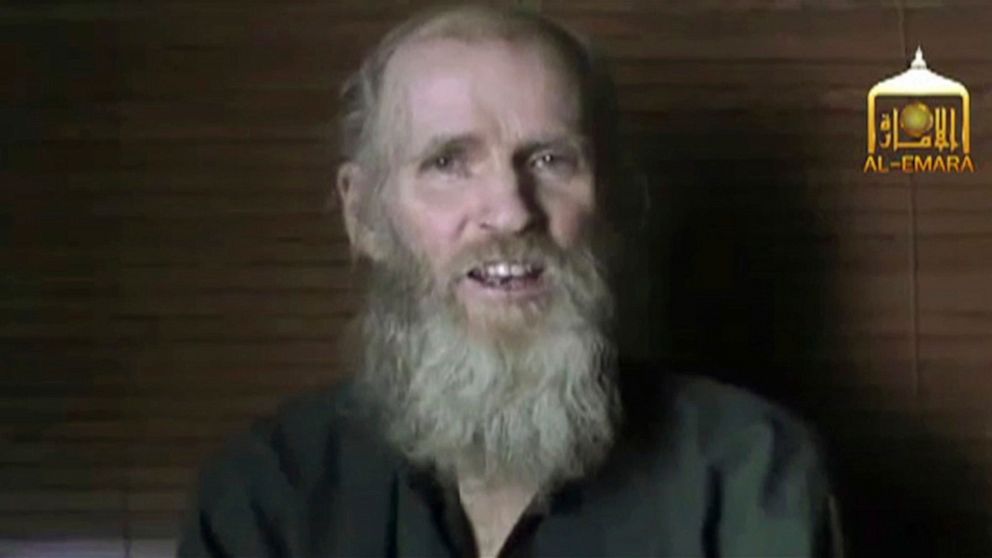US and Australian hostages held by Taliban for over 3 years released in prisoner swap
LONDON -- An American and Australian professor who were kidnapped in Afghanistan and held hostage for more than three years have been released by the Taliban in a prisoner swap aimed at restarting peace negotiations between the United States and the Afghan militant organization.
American Kevin King and Australian Timothy Weeks were both professors at the American University of Afghanistan in Kabul when they were ambushed and abducted by gunmen while leaving the campus in August 2016. They had appeared in a proof-of-life video looking gaunt and disheveled in January 2017 requesting then-President-elect Donald Trump secure their release by agreeing to a deal.
"We are so happy to hear that my brother has been freed and is on his way home to us," King's sister, Stephanie Miller, said in a statement to ABC News. "This has been a long and painful ordeal for our entire family, and his safe return has been our highest priority. We appreciate the support we have received and ask for privacy as we await Kevin's safe return."
Three senior members of the Taliban were released from Afghan government custody in exchange for the two men, which the Taliban said were "good steps for building trust" and something that "can help in the peace process," according to The Associated Press.
The three Taliban prisoners released were named as Anas Haqqani, Haji Mali Khan and Hafiz Rashid. Haqqani is a leader of the Haqqani group, a network that has been blamed for several attacks and the deaths of hundreds of U.S. troops since 2001. Haqqani's imprisonment by the Afghan government is said to have prompted the kidnapping of King and Weeks.
The hand-off of King and Weeks in eastern Afghanistan was facilitated by a U.S. special mission unit from Joint Special Operations Command, according to a counterterrorism official. In 2015, when prisoner of war Army Sgt. Bowe Bergdahl was freed in a similar swap, Alpha Squadron from the Army's elite Delta Force handled the pickup, which the Taliban videotaped and released afterward.

Just last week, Afghanistan President Ashraf Ghani said the decision was "a tough, but important" one and one he had to make in the interest of the Afghan people.
With King's freedom after three years in captivity with the Afghan Taliban's Haqqani Network, there remain a total of three Americans still held hostage by terrorists overseas, counterterrorism officials have told ABC News. They include Paul Overby, who is believed held by the Taliban in Afghanistan, Jeffery Woodke, a missionary taken hostage in Niger by ISIS, and a third U.S. citizen whose name and circumstances are not public.
The American and Australian professors were kidnapped after word got out that Haqqani -- brother of Afghan Taliban leader Siraj Haqqani and son of legendary mujahideen commander Jalaluddin Haqqani -- had been tried and sentenced to death in Kabul. That "ticked off the Taliban," a western intelligence official said at the time, and they kidnapped professors off the street in retaliation.
Weeks after the two professors were abducted, a video was released by the Taliban featuring Caitlan Coleman, a Pennsylvanian held hostage by the Haqqani Network for five years in North Waziristan with her Canadian husband and three children. Coleman said that she and her family would be killed if any harm came to Taliban prisoners, which officials interpreted as Anas Haqqani.

Two years ago, however, Coleman and her family were freed in Pakistan. On Tuesday, Coleman sent her best wishes to King, Weeks and their families.
"Welcome home, Kevin and Tim. Though we be strangers, the news of your safety at last has lifted my heart and causes me great relief. I am grateful also to the governments that worked to secure their safe return from the hands of the terrorists," Coleman said in a statement to ABC News.
Paul Overby’s wife, Jane Larson, said in a statement to ABC News Tuesday that she is glad King and Weeks are finally free.
"I am relieved that at last the professors are free and will soon be home with their families," Larson said. "Paul has been missing since May 2014. During the last five and a half years, I have not received any definitive information regarding his status or location. I remain eager for information from his captors or the governments of Afghanistan or Pakistan, where he was traveling at the time of his disappearance."




